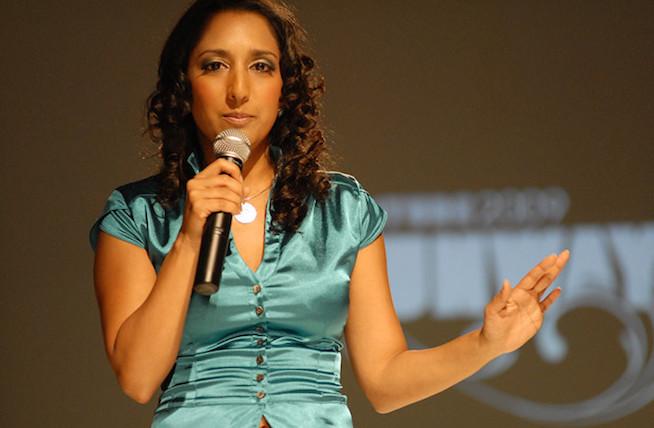
Dhaya Lakshminarayanan is one cool lady.
She's a stand-up veteran, a Moth Story SLAM host, and the host of Ravishly's very own podcast, Sarcasmic!
We wanted to formally introduce her to you, dear readers, and we know you'll love her as much as we do. Check out our latest podcast episodes with Dhaya, and keep an eye out for more in the future!
You’re an MIT grad and former business mogul! How did you make the switch over to comedy?
I made that switch into comedy pretty much like every single other standup does. I started by writing jokes and trying them out some of them. Some worked, some of them didn't. Rinse and repeat — meaning, you try your jokes at open mics and people ask you to perform on showcases and you get on better and better shows.
The process itself is straightforward; however, the art of creating standup is very difficult.
Does your professional background influence how you approach comedy?
It influences my comedy in that I consider myself a nerd and I am proud. So a lot of my comedy speaks from my experience about being a woman surrounded by men, being a nerd, and feeling left out in American culture.
The best thing about my professional background is that I have a strong business sense, so I know when I'm being paid fairly, when someone is trying to rip me off, how to think about contracts, and the difference between gigs that are positive for me and gigs that might dilute my brand.
You host the Moth Story SLAM in SF. What makes a good story? What makes a good storyteller?
Any story has to have the basics: a beginning, middle, and end. The story has to have some conflict, or a point at which there is a lesson learned or an inflection or decision that has to be made. If the story feels like a flat line, then it isn't a good story. Finally, a story has to be from your perspective. It has to have a strong voice, strong opinions about who you are in the midst of all this action. It can't just be about, Hey, this cool thing happened to my cousin Joe — let me tell you about it.
The more we can see your perspective and your point of view and how you are feeling and thinking in the midst of the action, the more audience is with you. Most of my stories include humor, but some of the best stories I have heard can make me cry.
You work in so many different mediums — do you have a favorite?
Standup comedy is my first love. My father is a physicist and he says if you know physics, you can fix a car, solve an equation, understand chemistry, and even paint and make music. Physics is the basic science which allows you to do everything else in life.
I feel that way about standup comedy. Standups have gone on to be sitcom actors, producers, directors, show runners, and even movie stars. The more and more I do other things, the more and more I find I come back to the basic simple medium of being able to construct a joke and tell it onstage and elicit a reaction. That simplicity makes it very beautiful and accessible.
What should readers know about your podcast, Sarcasmic? How has working in podcasting been so far?
Drew Harmon and I work on the podcast. Drew has all of the amazing equipment and we record. Sometimes, I have to redo certain things if it doesn't sound right. Drew also edits the podcast and makes it sound good with the intro, outro, and music.
The podcast allows me to go in-depth in a topic that might be serious with a lot of humor inside of it. I wouldn't have the luxury of doing this at a standup show, nor would I have the luxury of doing this for the storytelling show. It's a very special and unique medium where I can drop knowledge and drop jokes.
What question would you rather be asked in interviews than, “What’s it like to be a woman in comedy?”
HA! Yes, I do get asked that question quite often.
I think people are curious, because standup comedy has traditionally been a white male pursuit. And people are curious about how someone who is not that finds their way in it. It's like how people are curious about female venture capitalists, or female engineers, or female scientists. It's exciting that there are so many different kinds of people in pursuits that were only reserved for one type of person.
Interviews are always an interesting time for self-reflection, because I'm explaining my weird art form in various mediums to the rest of the world. If I am being completely honest, I would love every interview to end with, “Can I come over and help you do some handy work around your apartment?” Although I'm great onstage, very funny, and can tell stories and do podcasts — I am really really bad with home repair and handiwork.

